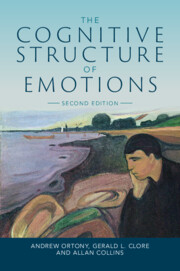Book contents
- The Cognitive Structure of Emotions
- The Cognitive Structure of Emotions
- Copyright page
- Dedication
- Contents
- Figures
- Tables
- Preface to the Second Edition
- Preface to the First Edition
- Chapter 1 Introduction
- Chapter 2 Overview of the Theory
- Chapter 3 Appraisal, the Value System, and Primary Sources of Intensity
- Chapter 4 Factors Affecting the Intensity of Emotions
- Chapter 5 Reactions to Events: I
- Chapter 6 Reactions to Events: II
- Chapter 7 Reactions to the Actions of Agents
- Chapter 8 Reactions to Objects
- Chapter 9 Formalization of the Theory and Additional Issues
- Chapter 10 There and Back Again: OCC and Affective Computing
- Appendix
- References
- Author Index
- Subject Index
Chapter 2 - Overview of the Theory
Published online by Cambridge University Press: 04 August 2022
- The Cognitive Structure of Emotions
- The Cognitive Structure of Emotions
- Copyright page
- Dedication
- Contents
- Figures
- Tables
- Preface to the Second Edition
- Preface to the First Edition
- Chapter 1 Introduction
- Chapter 2 Overview of the Theory
- Chapter 3 Appraisal, the Value System, and Primary Sources of Intensity
- Chapter 4 Factors Affecting the Intensity of Emotions
- Chapter 5 Reactions to Events: I
- Chapter 6 Reactions to Events: II
- Chapter 7 Reactions to the Actions of Agents
- Chapter 8 Reactions to Objects
- Chapter 9 Formalization of the Theory and Additional Issues
- Chapter 10 There and Back Again: OCC and Affective Computing
- Appendix
- References
- Author Index
- Subject Index
Summary
The three broad classes of emotions are characterized as Event-based emotions, Agent-based emotions, and Object-based emotions. Event-based emotions consist of a Well-being group, a Prospect-based group, and a Fortunes-of-others group. Emotion types in the first two of these groups focus on the self-relevance of focal events, while those in the Fortunes-of-others group focus on the self-relevance of events that primarily affect others. In addition to Event-based emotions are the Attribution emotions, which arise from focusing on the actions of agents, and the Attraction emotions, which result from focusing on objects. Also introduced is a group of Compound emotions. These emerge when focusing at the same time on both an event and an agent held to be responsible for that event. The three broad classes of emotions are evaluated (appraised) in terms of goals, standards, and tastes, respectively, and individual emotion types are distinguished by their location within this overall global structure of emotions. A skeptical view of the notion of basic emotions is presented.
Keywords
- Type
- Chapter
- Information
- The Cognitive Structure of Emotions , pp. 24 - 48Publisher: Cambridge University PressPrint publication year: 2022



